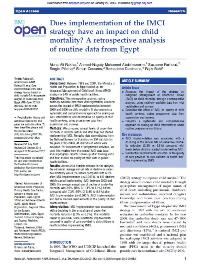 A retrospective analysis of national data from routine vital registration and surveys in Egypt, published in BMJ Open, finds plausible evidence that the implementation of the IMCI strategy (Integrated management of childhood illness) in the country doubled the rate of reduction of under-five mortality, from 3.3% before IMCI implementation to 6.3% after IMCI implementation. There was evidence that the quality of child health care services improved remarkably as a result of the introduction of IMCI in primary health care facilities.
A retrospective analysis of national data from routine vital registration and surveys in Egypt, published in BMJ Open, finds plausible evidence that the implementation of the IMCI strategy (Integrated management of childhood illness) in the country doubled the rate of reduction of under-five mortality, from 3.3% before IMCI implementation to 6.3% after IMCI implementation. There was evidence that the quality of child health care services improved remarkably as a result of the introduction of IMCI in primary health care facilities.
IMCI was introduced in Egypt in 1997. The analysis suggests that the systematic step-wise approach of introducing and rapidly scaling up the strategy in districts ensured quality standards of care in implementation during expansion. Planning and implementation addressed not only enhancing health providers’ clinical and communication skills through high-quality training and follow-up but also strengthening health system supports, from planning at district level to health facility readiness, availability of medicines, monitoring and supervision. Improvements were sustained over time. High political commitment, strong management structure, WHO-coordinated support with partners and early involvement of the academia were key enabling factors.
This study is important. It confirms that IMCI is an effective strategy to improve child health, when implemented as a comprehensive strategy. The study is an evaluation of a national programme in a country with a large population scaled up under routine circumstances rather than a controlled research conducted in a limited number of areas. Also, the analysis has made use of data already available, especially from routine vital registration and programme follow-up properly documented, proposing a model which can be replicated also in other countries where such data are available.
IMCI is currently implemented in 93% of primary health care facilities in Egypt. Under-five mortality in the country dropped by 75% from 1990 to 2011, a level of decline much greater than the two thirds needed to achieve the target of the Millennium Development Goal 4 by 2015.
The WHO Regional office has been promoting IMCI as a primary child health care strategy and providing technical support to countries in the Region from planning to implementation and evaluation. IMCI is currently being implemented at health facility level in 14 countries in the Eastern Mediterranean Region and has been introduced in teaching programmes of more than 60 medical schools in 8 countries.
Related links
Progress towards MDG 4 in Egypt
Systematic approach to IMCI implementation in Egypt
Medical schools which have introduced IMCI into their teaching programmes





 IMCI pre-service education: guide to evaluation
IMCI pre-service education: guide to evaluation